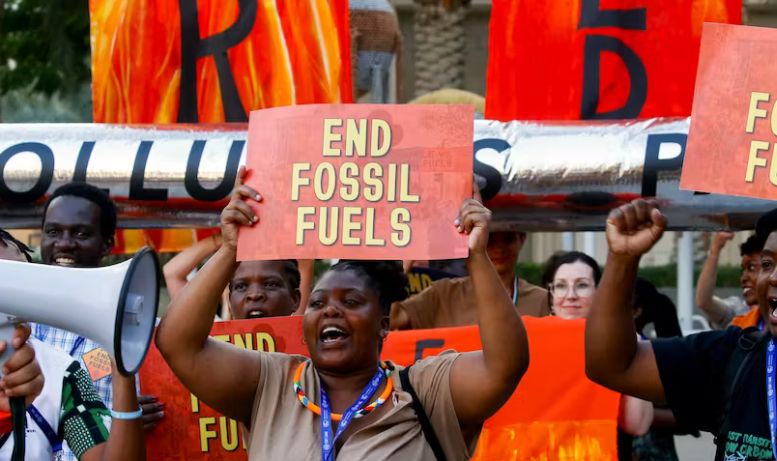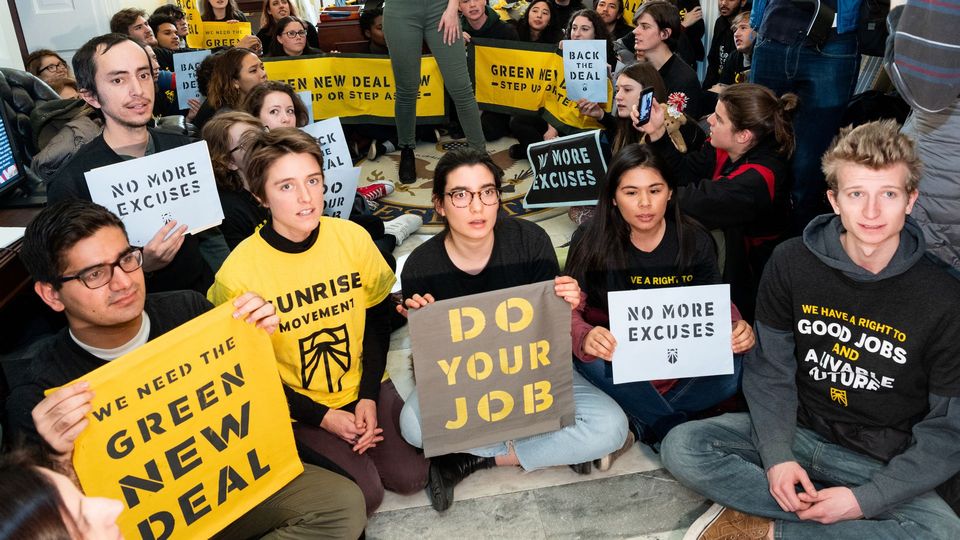David Rhoades is a member of Socialist Alternative in the US.
2023 demonstrated harshly and clearly what life would be like if we surpass the 1.5-degree Celsius threshold.
Europe saw record-setting temperatures yet again, after heatwaves contributed to 61,000 deaths in 2022. Wildfires in Canada, Greece, and Hawaii covered a significant portion of the world in smoke, undoing years of air pollution mitigation. Flooding in Greece, Bulgaria, Turkey, and Libya led to heavy loss of life and massive displacement.
We may not have hit 1.5 degrees of warming yet, but climate disaster is here. The average global temperature reached 1.4 degrees Celsius above pre-industrial levels for the first time this year —on the edge of the target set by the Paris Agreement in 2015 at COP21. Every year since then, capitalist leaders have failed to make meaningful progress toward curbing greenhouse gases, with industrial powers like the US and China doubling-down on fossil fuels.
COP28, which concluded on December 12, was no exception.
COP28 a “Trade Fair” For Oil Industry
Given that the last nine years are the nine hottest years on record, one might expect COP, the “Conference of Parties” or the annual UN Climate Summit, to become increasingly urgent in its efforts to curtail greenhouse gas emissions. Instead, the gathering of world leaders now resembles an industry convention for greenwashing Big Oil. Nothing illustrates this better than the United Arab Emirates, a major petrostate, hosting COP28.
“Over the last decade, the climate talks have become a complete lobby fest,” said Pascoe Sabido, a researcher at the Corporate Europe Observatory, a nonprofit group that seeks to expose corporate influence on policymaking. “It doesn’t feel like climate talks. It feels like a trade fair.”
UAE named Sultan Al-Jaber the COP28 president; Al-Jaber is CEO of UAE’s national oil company, Adnoc. While hundreds of oil industry lobbyists have been dispatched to COP for years, COP28 marked the first time that an oil executive was made president of the whole summit. The ties between Adnoc and COP28 were widely reported in the leadup to the conference, including: Adnoc representatives steering PR for COP28 at UN events, Adnoc employees consulting on how the summit should respond to media inquiries, and Adnoc adding talking points to COP28 briefing documents for meetings with foreign governments.
This last point is the most egregious. The President of each COP is supposed to spend months before the summit meeting with foreign governments to, ostensibly, coordinate bold action on climate. Adnoc prepared talking points to leverage these meetings into business deals for Adnoc and UAE’s renewable energy company, Masdar—where, absurdly, Al-Jaber was the founding CEO and is currently chairman. Masdar’s role on paper is to steer UAE away from fossil fuels; in reality, using major US PR firms, Masdar has been a political tool for the UAE to win billions in renewable energy funding and rehabilitate its image as a petrostate. For all of Masdar’s PR, in 2021 only 2% of UAE’s energy mix came from renewables and nuclear—far below the 24% it pledged in 2015.
Activists Locked Outside While Lobbyists Sit At The Table
These events, attended by the leaders and moguls of world capitalism, have recently become a lightning rod for activists as well. COP26 in Glasgow was attended by tens of thousands of climate activists, including a contingent from International Socialist Alternative. The presence of so many protesters drew attention to the fact that COP26 was an anemic failure; the next year, COP27 was held in Sharm-el-Sheik, Egypt under the dictatorial al-Sisi regime where protesters were limited to an area far from the conference center.
COP28 continued that trend, treating activists with increasing hostility. With broad laws restricting speech, Dubai is not friendly to protesters even under normal circumstances. This year, activists were limited to an international “Blue Zone” and were barred from naming countries or corporations on their banners. Palestinian flags could not be flown or activists risked being kicked out; protests during lunch (the only time attendees would see activists at all) were barred apparently for ‘heat safety.’
Meanwhile, Al-Jaber has previously expressed how important it is for oil and gas industry leaders to “have a seat at the table” when discussing how to cut emissions. Al-Jaber has never welcomed the millions of working people due to be displaced by oil and gas to the same table.
Another Failure To Move Forward
The world’s most important climate summit ended with an agreement from 200+ countries to “phase out” fossil fuels, which has been lauded as a diplomatic victory by US and UAE capitalists. But these are the same leaders who agreed to “phase down” coal-fired plants in 2021 only for global coal usage to increase to profit from rising energy demand. Neither Biden nor Xi Jinping – representatives of the two largest greenhouse gas producers – even attended. COP28 might be the most well-attended climate summit in history, but most of its attendees were representing business interests, not human ones.
After the summit, the Saudi Arabian energy minister was eager to clarify that the transition away from fossil fuels would not affect oil exports; meanwhile, US oil production is ramping up and Europe is investing in liquified natural gas.
As it stands, if every pledge made by attendee nations was 100% fulfilled – an unprecedented event – it would reduce greenhouse gas emissions only by a third of what’s needed to meet the 1.5-degree Paris Agreement target. The agreement doesn’t even call for nations to stop the production of new coal plants, which China and India are currently expanding.
The agreement also fails to address the massive inequality between wealthy and poor nations. Nigeria’s environmental minister argued that without wealthy countries financing a transition out of fossil fuels, African nations would be forced to accelerate fossil fuel use to raise the capital to switch to green energy.
“Developed countries say a great deal about ambition in tackling the climate crisis when standing before the media,” said Diego Pacheco, Bolivia’s lead negotiator. “But in the negotiation rooms of this conference they are blocking and creating distortions and confusion and adding complexity to all the issues that are priorities for developing countries.”
In Southeast Asia, Africa, and Latin America, renewable energy projects might become another financing scheme by which wealthy nations dominate less developed economies. The foundational issue here isn’t fuel production, but capitalism forcing nations to compete with one another to avoid falling behind.
Hot & Cold Wars Driving Climate Destruction
The role of war in climate is increasingly difficult to ignore. During COP28, representatives from multiple nations took an opportunity at the podium to criticize Israel’s assault on Gaza, violating a general agreement to avoid ‘politics’ at the climate summit.
But war is a major driver of gas emissions. The world’s military account for 5.5% of all greenhouse gas emissions, according to best estimates. All researchers have are estimates because military greenhouse gas emissions were exempted from reporting for national security reasons by the 1992 Kyoto Protocol and reaffirmed by the 2015 Paris Agreement.
The wars in Ukraine and Israel—both funded in large part by the US – are the result of heightened international tensions created by capitalist crisis. The more capitalism convulses and flails, the more likely it becomes for military conflict to explode between competing nations. The logic of the New Cold War isn’t going away, and neither is the possibility of increased armed conflict that will further increase emissions.
But the largest effects of the New Cold War reach beyond military production. The US and China blocs of global capitalism have ramped up fossil fuel production to prevent the other from gaining a capital advantage. In 2022, China invested in coal plants to boost short-term profits to keep pace with the US. China’s new coal plants would generate emissions equal to Spain’s. Similarly, the Ukraine war gave the US a pretext for ramping up oil production. One effect of this is the Willow Oil project – an oil drilling venture in Alaska that will add 2 million cars’ worth of emissions to the atmosphere.
While US capitalism is doubling down on oil, Bloomberg criticized China’s exemption from emissions standards imposed on wealthier nations. US capitalists aren’t critical of China’s emissions out of concern for the environment but to limit Chinese growth. The competitive logic of capitalism is compelling both blocs to forgo long-term emissions goals for short-term gains.
Climate Is A Problem Only Workers Can Solve
COP28 was a failure, as was COP27, as was COP26. Sultan Al-Jaber’s brazen use of COP28’s credibility to win contracts for Adnoc and Masdar weren’t anomalies so much as the natural outcome of bringing capitalist governments into a room together. Capitalism is incapable of putting aside short-sighted competition for the collective good; the profit motive inherent to capitalism, and the opportunity to secure a competitive advantage against everyone else, is always the higher priority.
Any meaningful, large-scale international cooperation will be limited by the competitive logic of the New Cold War. As long as COP attendees represent the increasingly desperate capitalist classes of their respective countries, any progress on climate issues will be insufficient to prevent widespread disaster.
We don’t need another trade show for oil executives to rub elbows with state officials. What’s needed is an international working-class climate movement who can lead the way toward rapid adaptation and replacement of fossil fuels with renewable sources.
It’s only workers – the people who actually produce, maintain, and manage the world’s production and resources – who are capable of taking decisive action on climate, who are capable of organizing production on an international scale for the benefit of all, not just a few. And it’s only under socialism that our collective ability to change the world and solve our problems can be fully realized.
Each successive COP shows us that capitalism doesn’t have the tools to solve climate problems. As workers, the solution to climate change is in our hands alone.



